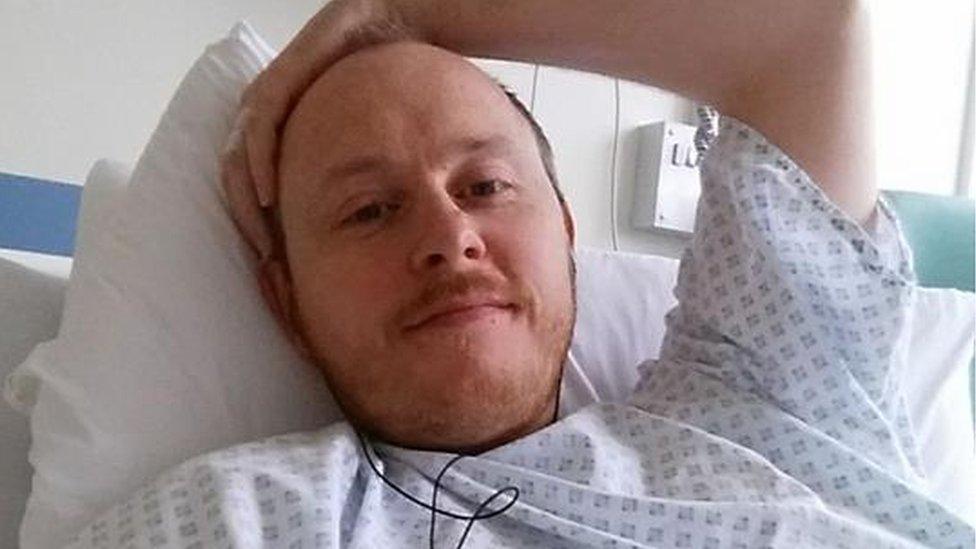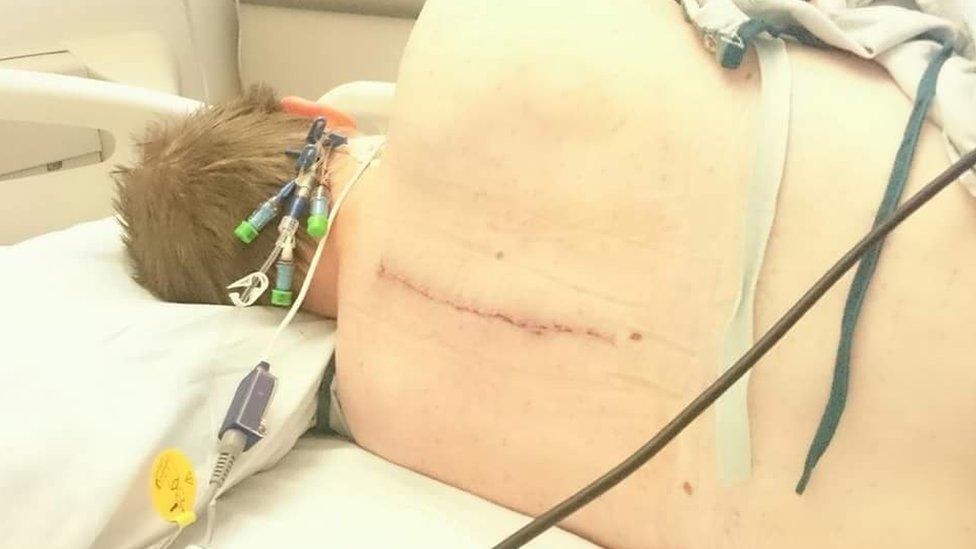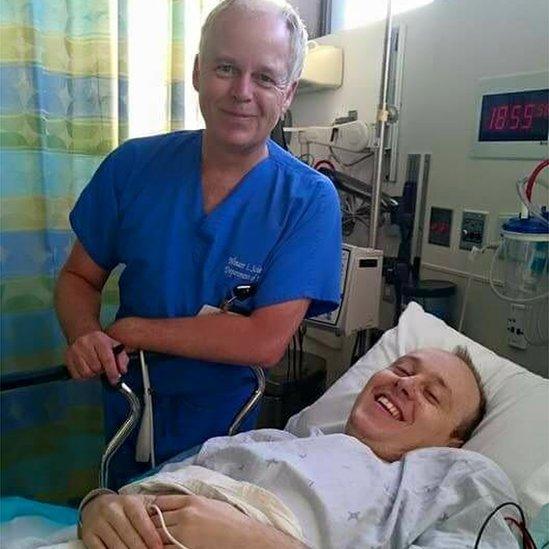The headache that changed my life
- Published

David Baldwin developed CSF leak more than four years ago
Four years ago David Baldwin woke up with a crippling headache that has completely changed his life.
David, from Ross-shire, can no longer sit up or walk without experiencing excruciating pain and he must avoid laughing or sneezing because they are a risk to his health.
The 37-year-old is one of about 3,250 people a year in the UK who develop a cerebrospinal fluid leak (CSF leak).
The condition occurs when fluid leaks from the membrane that surrounds the spinal cord or brain, leaving the brain less supported.
It can be caused by trauma or surgery, such as receiving an epidural during childbirth, and its effects can be devastating.
George Clooney said that when he suffered an injury to his spine on the set of his 2005 drama, Syriana, the resulting CSF leak led him to consider suicide.
'Out of the blue'
However, despite his story, the condition remains largely unrecognised by most frontline medical staff.
David told BBC Radio Scotland's Kaye Adams programme: "For me it pretty much came out of the blue.
"I used to do white-water kayaking. I was kayaking one evening and I just didn't feel well.
"I had a shortness of breath and I had heart palpitations and I felt a little bit dizzy, but I couldn't really put my finger on it.
"I went home and went to sleep and didn't really think too much about it."
David said that the next morning he had a terrible pain in head.
"It wasn't your normal sort of headache that you could take a paracetamol and forget about it," he said.
"It was a very prominent headache and it kept getting worse.
"As I was getting ready to go to work this headache was ramping up and by the end of the day I couldn't even stand.
"I couldn't walk between the bedroom and the bathroom. I had to crawl, it was that extreme."

Doctors think David's leak is somewhere in his upper spine
As the days passed, David, who is 37, started to develop other symptoms.
His vision started to go blurry, his hearing began to go, he had tinnitus constantly and his concentration and memory were also affected.
He said: "One of the very odd symptoms that people with CSF leak get is this odd feeling that your brain is being pulled down your spine.
"It's a very hard symptom to express to somebody that hasn't felt it.
"It's a kind of unrelenting pressure, as if there is bricks on your head, pushing your brain down."
Doctors have since tried unsuccessfully to treat David's CSF leak, which is thought to be somewhere on his upper spine.
He has also been treated in Los Angeles by Dr Wouter Schievink, the same surgeon that successfully treated George Clooney's condition.
'Back with a vengeance'
However, David is yet to resume his former life and says since developing CSF leak, he has lost his job and found that the only way he can get relief is by lying down.
"When you're lying down, you don't have [the symptoms] or they're much reduced," he said.
"But as soon as you sit up or stand up, they come back with a vengeance.
"It is that element that makes it such a disabling condition and you just can't live your life like that."
David said that was one of the cruellest elements of CSF leak.
He said: "You can feel like you can get up and go to work, you can live your life.
"But as soon as you sit up, it's like an egg timer, it's only a matter of time before these horrific symptoms come back and force you back to bed again.
"It's a very tough one to live with. It's very disabling for many people and for most it's certainly very life-changing."

David was treated by Dr Wouter Schievink, who also treated George Clooney
In the past two and a half years, David has left home no more than 10 or 15 times and most of that has been on a stretcher or in an ambulance to go for treatment or scans.
After first developing his life-changing headache, it took three months for David to be diagnosed.
However, he was one of the lucky ones. On average Scots with CSF leak face a 13-month wait before they know what is wrong with them.
James Walkden, a neurosurgeon who is now helping to treat David, said there was much to be done to educate medical staff on CSF leak.
'Early stage'
He said: "I have to say the teaching about this condition at medical school and even at post-graduate is zero.
"It's really only a small sub specialist area of neurosurgery or neurology that even recognises this condition and that's why unfortunately there's often multiple visits to medical professionals, multiple mis-diagnosis before they reach somebody who does understand this condition.
"But by then months have turned into years and your success rate of the investigations and the treatment diminishes as time goes on.
"So, it's not that we're stumped, it's unfortunately recognition of this condition at an early stage and getting the person to the right department with the right expertise."
More information about the condition is available at the CSF Leak Association, external.